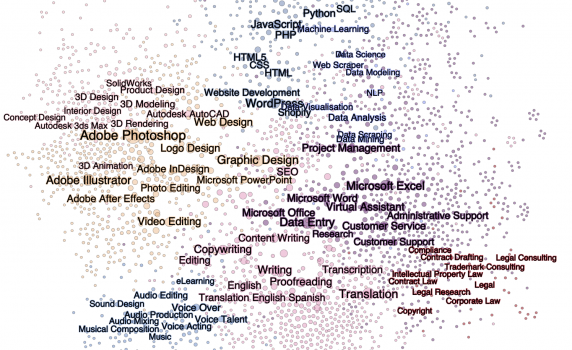
Dr Fabian Stephany
Departmental Research Lecturer
Fabian is a Departmental Research Lecturer in AI & Work at the Oxford Internet Institute.
In my article, ‘One size does not fit all: Constructing complementary digital reskilling strategies using online labour market data‘ published in Big Data & Society 8 (1), I argue that learning something new is a complex and individual endeavour with no single best choice for everybody. However, big online data can help us to find new skills that best fit our needs and complement our individual capacities.
Digital technologies are radically transforming our work environments and demand for new skills. Today, we are facing a labour market where certain tasks are automated by increasingly smart algorithms and, at the same time, new capacities are required to work together with digital technologies. This technology shift can easily overwhelm workers, companies, and education providers. In addition, the COVID-19 lockdown has further accelerated digitalisation and tightened company budgets while forcing many workers to learn new skills from home.
In this challenging situation, some independent workers have taken matters into their own hands. Online freelancers, that is people that are selling their work via the internet, have started a new trend in learning. They acquire new skills step-by-step via social learning tutorial and online education providers. The marketplaces on which these freelancers are selling their work are so-called online labour platforms.
For online freelancers, occupations are often just “containers” that they fill with an individual set of carefully selected skills. During this process, online labour platforms have become fascinating laboratories for the individual recombination of skills: Here, we can observe how freelancers acquire new skills, merge them with their existing capacities, and thereby improve their job market position. With the data from online labour platforms, researchers can create a map of how occupations and skills are related.

In this map, skills (nodes) are closely gathered together, if they are often jointly applied by a worker. The network logic behind this graph can help learners, when searching for a new capacity to complement their existing set of skills with. Here, only a popular set of skills is labelled.
Interestingly, the analysis of this network data shows us that the benefits and costs of learning something new depend on what a worker already knows. It is not that we all just need to learn programming to shine on the job market of the future. One and the same skill can inflict different costs and leverage different benefits depending on the existing skill set that it complements. Learning a programming language might be very profitable for some workers, while crafting skills in design could be a better option for others.
In cooperation with freelance platforms and online education providers, researchers and policy makers should make use of this valuable glimpse at the future of learning. Using online data, learners could receive a personalised recommendation on which skills to develop complementing their own capacities, helping them to find sustainable jobs, and reducing labour market mismatches in a future of technological disruption.
Watch Fabian Stephany deliver the video abstract of his paper ‘One size does not fit all: ‘Constructing complementary digital reskilling strategies using online labour market data‘, published by Big Data and Society.
